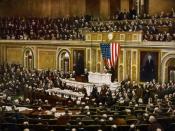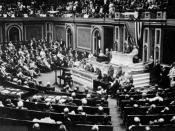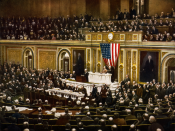Outline
I. Introduction
A. Quote
B. Question: What events caused the world to go to war? Why did the United States become involved?
II. Body
A. Nationalism and Imperialism
B. Assassination of Archduke Francis Ferdinand
C. The United States and the War
1. Neutrality
2. Trade
3. U-boats
III. Conclusion
A. Mention most important points
B. Answer question
IV. Bibliography
Introduction
On the day of April 2, 1917 President Woodrow Wilson went before Congress asking for a declaration of war.
It is a fearful thing to lead this great peaceful nation into war, into the most terrible and disastrous of all wars, civilization itself seeming to be in balance. But the right is more precious than peace, and we shall fight for the things which we carry nearest our hearts, -- for democracy, for the right of those who submit to authority to have a voice in their own government, for the rights and liberties of small nations, for a universal dominion of right by such a concert of free peoples as shall bring peace and safety to all nations and make the world itself at last free.
(Divine, Breen, Fredrickson, and Williams 703).
Nationalism along with the assassination of Archduke Francis Ferdinand may have pushed foreign countries to war, while the United States entered the war for yet other reasons. What events caused the world to go to war? Why did the United States become involved?
World War 1: Reasons behind the War and United States involvement
Nationalism and Imperialism
Major factors causing tensions in Europe, before World War 1, were the feelings of loyalty to one's country (Nationalism). Nationalistic feelings resulted in the idea that people of the same ethnic origin, language, and political ideas had the right to independent states. These ideas allowed Greece, Montenegro, Serbia, Romania,



WWI
very organized, neatly arranged, detailed but to the point.
2 out of 2 people found this comment useful.